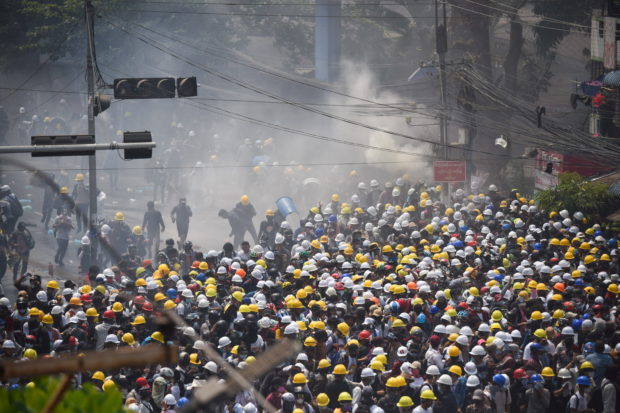U.S. imposes sanctions on children of Myanmar military leader, companies

People participate in a protest against the military coup in Yangon, Myanmar, March 2, 2021. Picture taken from behind a window. REUTERS/Stringer
WASHINGTON – The United States on Wednesday imposed sanctions on two children of Myanmar’s military leader Min Aung Hlaing and six companies they control in response to the military’s Feb. 1 coup and the killing of protesters since the takeover.
The U.S. Treasury Department said in a statement it blacklisted Aung Pyae Sone and Khin Thiri Thet Mon, the adult children of Myanmar’s commander in chief who led the coup and installed himself as head of the ruling State Administration Council.
U.S. Secretary of State Antony Blinken warned more punitive actions could follow, and condemned the detention of over 1,700 people and attacks by Myanmar’s security forces against unarmed protesters that he said have killed at least 53 people.
“We will not hesitate to take further action against those who instigate violence and suppress the will of the people,” Blinken said in a statement.
The military has brushed off condemnation of its actions, as it has in past periods of army rule when outbreaks of protest were forcibly repressed.
Article continues after this advertisementWednesday’s move – the latest in a series of punitive actions taken by Washington against Myanmar’s military over the coup – essentially freezes any U.S. assets of those blacklisted and generally bars Americans from dealing with them.
Article continues after this advertisementCampaign group Justice for Myanmar said in January that Min Aung Hlaing, who has been commander in chief since 2011, has “abused his power to benefit his family, who have profited from their access to state resources and the military’s total impunity.”
The six Myanmar companies blacklisted by Washington include A&M Mahar, which is controlled by Aung Pyae Sone, the general’s son. Justice for Myanmar said A&M offers foreign pharmaceutical companies access to Myanmar’s market by obtaining approvals from Myanmar’s Food and Drug Administration.
John Sifton, Asia advocacy director at Human Rights Watch, praised the Treasury’s move for directly hitting at the wealth of Min Aung Hlaing, but called for stronger action.
“These are not the kind of punitive actions that we believe will lead to behavioral change. We are recommending they focus on ongoing revenue streams which are far larger and if cut off would be far more painful to the military as an institution,” Sifton said, referring to oil and gas revenues produced by projects that involve international companies.
The United States has so far held back from imposing sanctions against military conglomerates Myanmar Economic Corporation (MEC) and Myanmar Economic Holdings Limited (MEHL), among those used by the military to control vast swathes of the country’s economy.